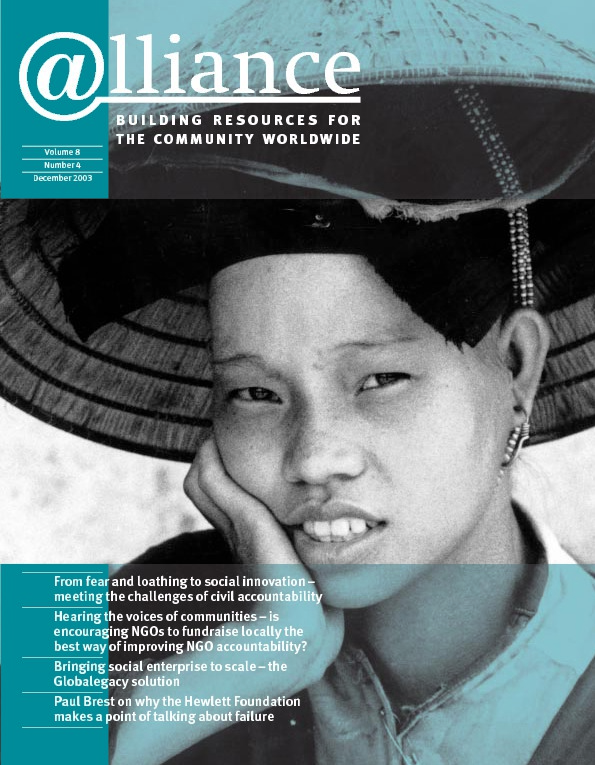In this issue, for the first time, Alliance pays tribute to a departed colleague. We remember and honour the accomplishments and deeds of an extraordinary life devoted to international philanthropy. In Alliance Extra, we open a portfolio of personal remembrances and invite readers to add their own stories about the remarkable John D Gerhart.
John Deuel Gerhart died on 15 July 2003 at the age of 59 from cancer of the appendix. He was born in 1943 in Abiline, Texas, the son of an Episcopal minister. His lifelong devotion to international development began when he took a year off from undergraduate studies at Harvard University to teach high school in Tanzania. After graduation, he spent a year on a travelling fellowship at Uganda’s Makerere University, followed by graduate studies at Princeton University, where he earned first a masters and then a doctorate degree. In 2001, Princeton’s graduate faculties named him as one of their hundred most notable alumni of the twentieth century.
From 1969 until 1998, John worked in the international division of the Ford Foundation in various capacities: as adviser to the Kenyan government and Botswana Ministry of Agriculture, assistant representative for East Africa, representative for the Middle East and North Africa, deputy vice president for international programs, and regional director for Africa and Middle East programs. He was the foundation’s first representative for Southern Africa, and opened the Johannesburg office in 1993. His work at Ford involved many aspects of life in developing countries, including rural development, women’s rights and reproductive health, university development, land reform, human rights, and the promotion of third world arts, culture and indigenous philanthropy.
From 1998 to 2002, John served with distinction as president of The American University in Cairo. In recognition of his contributions to higher education in Egypt, President Hosni Mubarak awarded him the country’s First Class Decoration for Arts and Sciences in 2003.
As impressive as this formal biography may be, the exceptional thing about John was the depth of knowledge and intelligence that he brought to each and every responsibility and programme theme.
To take just one of many cases, John’s leadership of the first Ford Foundation office in South Africa occurred during the heady days of transition from apartheid tyranny to fledgling democracy. John drew a creative, courageous and sensitive line in South Africa, moulding Ford’s programme into an enduring model for nation-building support. His grants helped South Africans to build strong democratic institutions, a new Constitution, and the infrastructure for a vibrant independent civil society. He moved Ford firmly into arts and culture with support for building institutions expressive of the new South Africa. Funding for policy planning underpinned land reform, education reform (particularly higher education) and economic development, among other urgent areas.
But what stood out – and is most appreciated to this day – was John’s faith in South Africans to find their way through to a civil and democratic society. John’s brand of philanthropy was always empowering, as was proved across diverse, difficult and often fragile times. The secret of his success may have been his genuine and transparent respect for people. John looked for and usually found reasonable explanations for what people felt and did. I remember coming to him during those tumultuous days of interregnum in South Africa in despair over a particular turn of events in the NGO sector. He heard me out and then, as only he could do, he reflected thoughtfully on what the offending people could have been thinking. He did this in a way that invoked both the folly and the merit of our shared condition as outsiders who dared to enter the crucible of the new South Africa. And he did it in a way that enabled us to devise a strategy to engage on this issue that ultimately, when applied, succeeded in heading off the problem that had so upset me.
In looking for a role model for philanthropy – or indeed human fellowship – in the 21st century, one need look no further than the life of John D Gerhart. To learn more about his life and influence, please go to the portfolio of tributes in Alliance Extra.
This article was compiled by David Bonbright from materials prepared for John’s memorial services in New York (12 September 2003), Cairo (28 September 2003) and Johannesburg (3 October 2003).



Comments (0)